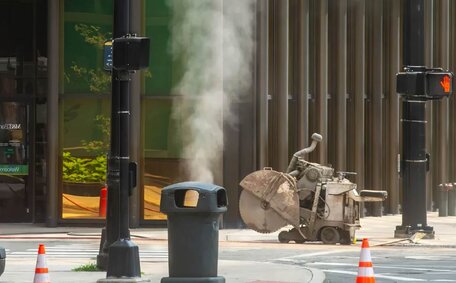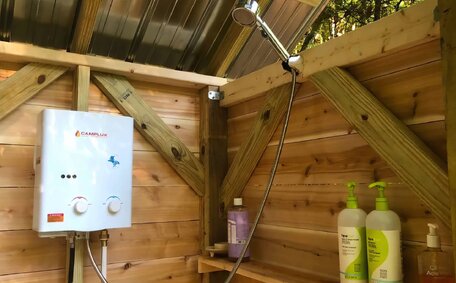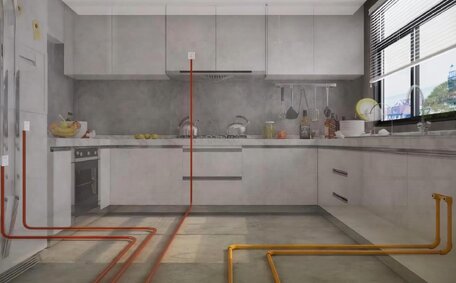
How To Move A Gas Meter
Need your gas meter relocated? You can’t move it yourself - contact your supplier to arrange for a gas engineer to reposition it safely. Charges may apply depending on circumstances.
Read MoreAustralian property owners favor DIY solutions to save costs on clearing blocked drains and household tasks. Dealing with clogged pipes or sewer lines is frustrating, and homeowners often wonder about the cost to effectively clear blocked drains, given the risks of delaying repairs. This guide evaluates the viability of DIY plumbing for homeowners within Australian residential tenancies act and regulations.
Our guide covers licensing-required tasks in New South Wales, safety precautions, and potential expenses, including costs for clearing blocked drains, for allowable DIY work. We’ll examine the impact of plumbing issues on your projects, explore common problems, and methods to clear blockages, urging you to inform your landlord or consult a local plumber before attempting DIY.
Clearing minor drain blockages from substances like hair or grease is possible with a correct approach; however, severe issues require specialist intervention. Regular plumbing maintenance and cost awareness are key to protecting your home and personal well-being, preserving pipe condition and complying with tenancy laws.
This includes understanding expenses for doable plumbing tasks, such as using a plunger or drain snake to clear simple sink or tub blockages. Low-risk chemical drain cleaners can also save on expenses for minor blockages, including those from wet wipes, soap scum, and food remains, if used carefully.
However, extensive plumbing drainage repairs like those involving mechanically clearing tree roots, which can cause significant issues, fixing collapsed or damaged pipes, or high-pressure water jet cleaning of fully blocked sewer lines require professional equipment and compliance with Fair Trading regulations. Under NSW Fair Trading statutes, any illegal diy work in plumbing exceeding $1000 must involve a licensed plumber to fix it, with severe penalties for non-compliant DIY plumbing in rental homes or strata schemes.
Consult local experts about Australian plumbing work costs and ensure you comply with regulations, including the Plumbing and Drainage Act 2011, which mandates hiring a licensed plumber for certain tasks in New South Wales. All plumbing works, especially those entailing drainage jobs over $1000 in value, must give the responsibility to a licensed professional with requisite certification.
This pertains to substantial projects that a plumber can take on, ready to breakdown any complexities involved, concerning the entire drainage system, like hydro jetting clear blocked drains, sewer repairs, drain relining, managing stormwater drainage issues, gasfitting installations, and more. Non-compliant DIY plumbing can incur penalties up to $22,000, an amount comparable to significant rent accrual, underlining the importance of adhering to regulations.
Compliance certificates provide written confirmation from professionals that appropriate materials and techniques were used, crucial to safeguarding your water supply during major projects. This ensures the health safety standards are met for your property, addressing who is responsible for maintaining the integrity of Sydney Water pipelines in the plumbing system.
Certain essential tasks like replacing a faulty valve washer or using a plunger to unclog sinks remain lawful for DIY plumbing. Although assessing some blockages in toilets and kitchen drains is feasible, major issues with your home’s hot water system and main pipelines necessitate a professional plumber.
Regulatory compliance, as advised by Consumer Affairs Victoria, helps protect landlords from legal issues, fines, and damages resulting from failed DIY repairs, ensuring only skilled tradespeople tackle complex plumbing tasks.
Australian homeowners can legally perform basic drain repairs and clearing methods without professional plumbing qualifications:
While DIY solutions may temporarily resolve clogs, understanding the scope of plumbing work is crucial, as some repairs require more than just personal intervention.
Before undertaking DIY plumbing, engage with an advice advocacy service or your real estate agent to understand your responsibilities under tenancy laws, as rental property repairs may require approval and strata properties have their own rules.
If uncertain about your capability to manage a drain issue or whether it’s suitable for DIY, seek advice from your plumber, consider professional plumbing services, and schedule a plumbing inspection for guidance on complex or regulatory non-compliant repairs.
There are a few basic drain cleaning methods that residential homeowners can safely attempt themselves legally in Australia:
While helpful for basic home clogs, to deal with more extensive drain repairs within 14 days, such as mechanically clearing tree roots or fixing collapsed pipes, requires professional equipment and licensing.
Best practices for DIY drain cleaning, like wearing gloves and avoiding chemicals, also foster safe landlord-tenant interactions. If you’re uncertain about your ability to fix an issue, seek professional plumbing services to ensure it’s within your legal capabilities or to address the problem.
DIY plumbing on severely blocked drains without proper training or equipment presents significant risks:
The absence of special equipment like drain cameras and hydro jetters, capable of clearing tough clogs up to 4400PSI, along with the lack of advanced techniques for long-term solutions, presents other challenges.
Improper DIY plumbing may result in more expensive corrections, infrastructural damage, contamination, and violations of tenancy and safety regulations.
Avoid the risks of DIY guesses by engaging qualified specialists for complex blockage issues, and consider consulting an expert plumber when needed for quality outcomes.
Only a professional licensed plumber has the skills, equipment, and expertise required to safely address blocked drain issues:
DIY attempts to clear major obstructions can risk injury from bursting pipes and exposure to toxic sewer gases or raw sewage. It may also further rupture ageing pipes.
Only professional hydro jet drain cleaning services can generate enough water pressure (up to 4400PSI) to scour tough clogs including tree roots while preserving pipe integrity.
For assured high-quality results, adherence to regulations, and safety, choose the work can do yourself with our fully licensed specialists, who are suggested for diverse plumbing jobs, employ premium equipment such as CCTV cameras and high-pressure water jets, being well-versed in the complex conundrums that drains can pose, and they can also come to the rescue of your pipes in emergency situations. Contact us 24/7 for professional emergency urgent repairs on your blocked drains.
In Australia, all plumbing and drainlaying work valued over $1000 requires a licenced professional with appropriate certification under the Plumbing and Drainage Act 2011.
When engaging a plumber, homeowners must ensure:
Plumber licences confirm completion of TAFE courses and adherence to training standards, ensuring correct job performance. Using the right methods and materials is critical for the safety and long-lasting integrity of water infrastructure.
Compliance certificates reassure provider agents, verifying work conforms with strict Australian plumbing regulations. Certificates provide detailed information about the repairs completed and materials utilised.
Unqualified drainage repairs without appropriate licensing can result in fines, voided insurance, unsafe practices, and premature work failure. DIYers lacking requisite skills and professional equipment should avoid major blockage clearing, which could compromise the quality and thus affect the value should you decide to sell your home.
By hiring licenced, insured and experienced plumbers displaying their credentials openly, homeowners protect themselves against non-compliant work or poorly executed repairs down the track.
Australian homeowners are legally allowed to use basic plungers or drain snakes to address minor blockages from hair, residue, or debris.
However, extensive obstructions like tree roots, collapsed pipes or fully blocked sewer mains demand urgent professional hydro jet drain cleaning services and plumbing repairs. Only licenced plumbers have the specialised CCTV cameras, high pressure jetting equipment reaching 4400PSI and expertise to handle such complex jobs safely while preserving pipe integrity.
Untrained and unequipped DIY plumbing can lead to injury, infrastructural damage, severe fines, and botched repairs that may void insurance. Protect your property, finances and household by understanding exactly when basic DIY methods are sufficient versus calling qualified drain technicians.
For professional drain inspections, repairs or hydro jet drain cleaning services, contact our fully licenced drain plumber team, trusted as a rental provider, at 1300 349 338 or [email protected].
As industry veterans, we take your job seriously, operating in the South East region of Menai for over 25 years, we guarantee quality results and total compliance with all Australian plumbing regulations and your tenancy agreement.
Need your gas meter relocated? You can’t move it yourself - contact your supplier to arrange for a gas engineer to reposition it safely. Charges may apply depending on circumstances.
Read MoreInvesting in a solar hot water system can save up to 75% on water heating costs. With great returns and added home value, solar hot water can be a smart choice over electric or gas heaters. Contact us to see if it’s the right investment for your home.
Read MoreWhile natural gas and propane can both power appliances in your home, they have notable differences when it comes to BTU output, infrastructure, safety, cost and more. Understanding these key contrasts will help you determine which is better for your specific needs.
Read MoreMenai, 2234 NSW
We will call back as soon as possible.




